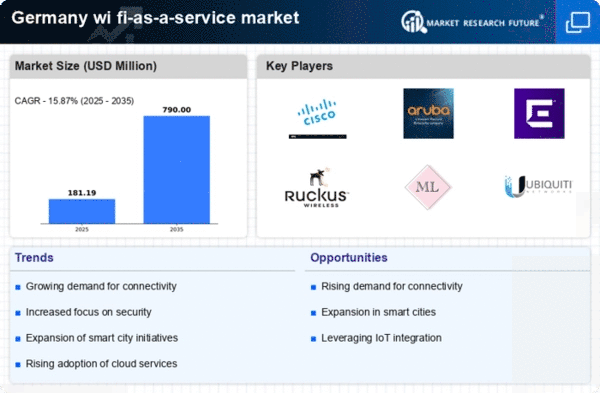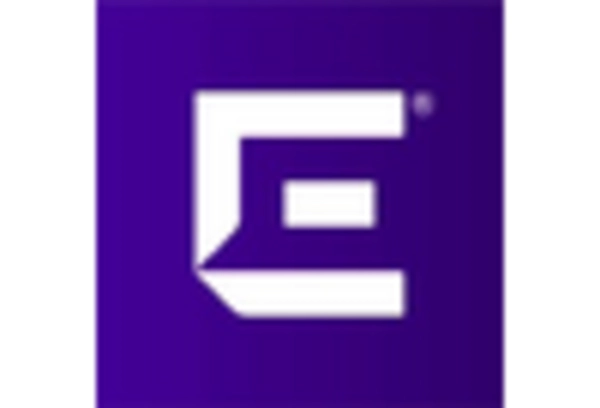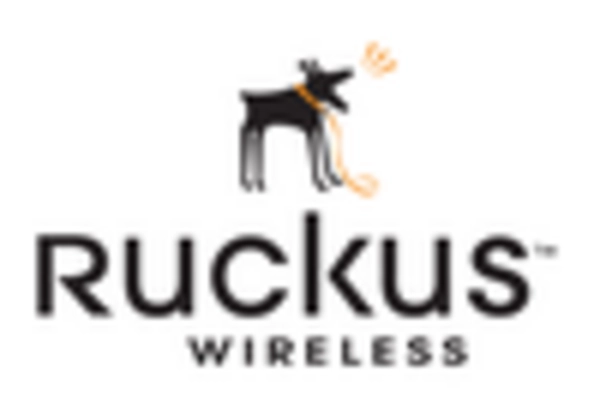Increased Focus on Cost Efficiency
Cost efficiency remains a critical driver for the wi fi-as-a-service market in Germany. Businesses are continuously seeking ways to optimize their operational expenses, and adopting wi fi-as-a-service can be a strategic move in this regard. By outsourcing their wireless network management, companies can reduce capital expenditures associated with hardware purchases and maintenance. Furthermore, the subscription-based model of wi fi-as-a-service allows for predictable budgeting, which is appealing to many organizations. Data suggests that companies can save up to 30% on their networking costs by transitioning to this model, making it an attractive option for those looking to enhance their financial performance.
Shift Towards Flexible Work Environments
The shift towards flexible work environments in Germany is significantly influencing the wi fi-as-a-service market. As companies adopt hybrid work models, the need for reliable and secure wireless networks becomes paramount. Organizations are increasingly opting for wi fi-as-a-service solutions to provide seamless connectivity for remote and in-office employees. This model allows businesses to scale their network capabilities without the burden of extensive upfront investments. Recent surveys indicate that over 60% of German companies are considering or have already implemented flexible work arrangements, which is likely to propel the demand for adaptable wi fi solutions that can support diverse work settings.
Growing Demand for High-Speed Connectivity
The increasing reliance on digital services in Germany has led to a growing demand for high-speed connectivity. Businesses and consumers alike are seeking reliable and fast internet access to support their activities. The wi fi-as-a-service market is positioned to meet this demand by providing scalable solutions that can adapt to varying user needs. According to recent data, approximately 80% of German households now have access to high-speed internet, which underscores the necessity for robust wi fi solutions. This trend is likely to drive investments in wi fi-as-a-service offerings, as organizations look to enhance their connectivity infrastructure to remain competitive in a digital-first economy.
Regulatory Support for Digital Infrastructure
Regulatory support for digital infrastructure development in Germany is fostering growth in the wi fi-as-a-service market. The government has been actively promoting initiatives aimed at enhancing digital connectivity across the country. This includes funding programs and policies designed to improve internet access in underserved areas. As a result, businesses are encouraged to invest in wi fi-as-a-service solutions to align with national objectives for digital transformation. The commitment to improving digital infrastructure is likely to create a favorable environment for the wi fi-as-a-service market, as organizations seek to comply with regulations while enhancing their connectivity capabilities.
Technological Advancements in Wireless Solutions
Technological advancements in wireless solutions are propelling the growth of the wi fi-as-a-service market in Germany. Innovations such as Wi-Fi 6 and mesh networking are enhancing the performance and reliability of wireless networks. These advancements enable better coverage, higher speeds, and improved user experiences, which are essential for both businesses and consumers. As technology continues to evolve, the demand for modern wi fi solutions is expected to rise. The integration of advanced features, such as enhanced security protocols and analytics capabilities, further positions wi fi-as-a-service as a compelling choice for organizations looking to leverage cutting-edge technology in their networking strategies.
















